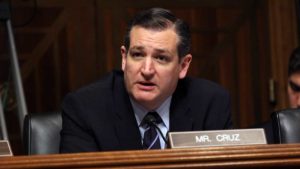by WorldTribune Staff, September 16, 2016
Texas Sen. Ted Cruz is fighting the Obama administration’s decision to give up U.S. control of Internet domain names to a global agency.
The U.S. is set to allow its contract overseeing ICANN, a California-based nonprofit charged with how Web addresses and domain names (including “.gov,” “.com” and “.edu”) are organized, to expire on Sept. 30, allowing ICANN to operate independently.

“Once the government’s out of the picture, First Amendment protections go away,” Cruz said on Sept. 14 at a Senate hearing he chaired.
“Why risk it? The Internet works. It’s not broken,” Cruz said. “What is the problem that is trying to be solved here?”
Opponents of President Barack Obama’s move to transfer control to ICANN say that giving up that power would allow authoritarian regimes like China and Russia to further censor free speech on the Web.
Cruz pointed out that ICANN is not bound by the First Amendment. He has filed legislation that would block the federal government from relinquishing its oversight.
Cruz pointed to previous statements made by former ICANN President and CEO Fadi Chehade, indicating that privacy concerns may subject some to pressure from foreign, authoritarian regimes to manipulate the Internet according to those regimes’ will.
“From ICANN’s standpoint, engagement with China is not an option. If we do not engage with China at every level of our community, we, frankly, lose a part of our global legitimacy,” Chehade said.
Cruz called that statement “striking.”
“It is striking that an organization we are being told we should trust with control of the Internet believes that legitimacy depends upon engaging in a regime that is the world’s leading censor on the Internet, silencing speech on the Internet, and that imprisons democracy and human rights advocate and Nobel laureate Liu Xiaobo.”
Cruz warned of an Internet run according to the will of China, or other oppressive regimes, and an Internet “run like one of our large, private universities today, with speech codes and safe zones,” in which “microaggressions” are censored and banned.
